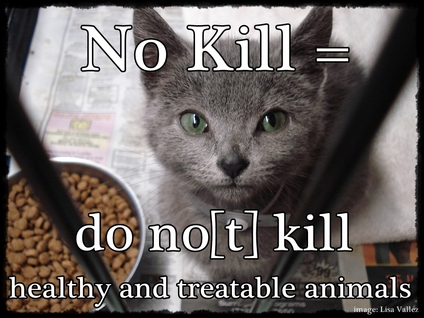|
There is a lot of talk these days about the phrase "no kill." It is much misunderstood and it makes a lot of people uncomfortable. There are those who say we should not use the phrase because it is divisive or because it offends people. Some would tell you that no kill is not possible or that it is irresponsible. Others say that we should use the phrase "low kill" instead. I'm not entirely sure what that even means. Some who oppose no kill philosophies use the phrase as a weapon to try to discredit a social movement which is changing our country, whether they like it or not. Yet others toss the phrase around and apply it to situations which have nothing to do with true no kill philosophies. I saw a story on the news last night from my area in which the phrase no kill was used inaccurately and this leads to my blog of today. This is what "no kill" means - and does not mean - to me. If you do not agree, that's perfectly fine. I'm writing this to bring some clarity to the subject for those who really have no idea what the rest of us are talking about. For an in-depth look at the phrase, I encourage anyone reading my blog to read this publication by the No Kill Advocacy Center called "Defining No Kill." No kill is a culture in which healthy and treatable animals are not destroyed in our shelters for space, convenience or following some tradition using our tax dollars or donations. In this culture, the only animals destroyed are those who are suffering, are irremediably ill or dogs who are so genuinely aggressive (as opposed to scared or traumatized) that they are unsafe to have in our communities (and for which no sanctuary placement is available).
No kill is not a definition. It does not mean that no animals ever die. To keep animals alive when they are truly suffering or are so genuinely broken that they present a danger to the public would be unethical and irresponsible. No kill is a philosophy which says the lives of all companion animals have value and that those animals must be treated as individuals, worthy of our time and attention to keep them alive. In this philosophy, homeless animals are treated as either having been someone's beloved companion or being capable of being that companion. They are essentially given the benefit of the doubt, treated as adoptable and not blamed for the fact that they need our help. No kill is not about simply keeping animals alive, regardless of the conditions in which they live. It does not allow animals' physical, psychological or emotional well-being to be compromised just so we can say "they are alive and we did not destroy them." No kill is about programs which function in concert with each other to both reduce shelter intake and to increase shelter output so that animals spend the least amount of time possible in an institutional setting. When animals are boarded for undefined periods of time, that is not no kill. That is a situation which is simply not sustainable financially. It can also cause animals to become so accustomed to living in a kennel environment that they are ill-prepared for the stimulation of life outside of the kennel. When animals are collected on rural properties out of the knowledge and view of the public and law enforcement authorities, that is not no kill. That is essentially collecting and more often than not it also involves neglect and abuse. When animals are kept at a "sanctuary" which does not function within its financial and physical ability to properly care for and then place those animals, that is not no kill. Overwhelmed sanctuaries are little more than animal prisons where the animals and the people caring for them are under incredible amounts of stress, often leading to disaster. No kill is about values and hope and compassion and about doing our very best for companion animals because we care about them and we want the very best for them. I understand that there are a lot of people out there doing a lot of great things to try to help animals and keep them alive. I think that any person who genuinely means well in their efforts to help animals should be commended. But with those efforts comes a responsibility to learn how to best care for those animals while avoiding a situation where the people essentially "flame out" - or are arrested- and we are left with a crisis situation where large numbers of animals have to be placed in very short periods of time. If you would like to learn more about no kill philosophies and about what the phrase really means, please educate yourself by doing some homework and by networking with people in no kill communities. You may say that you don't have time for that. I say you have to make time. The lives of companion animals depend upon you being not just a passionate advocate but an informed advocate.
0 Comments
Your comment will be posted after it is approved.
Leave a Reply. |
AuthorI am an animal welfare advocate. My goal is to help people understand some basic issues related to companion animals in America. Awareness leads to education leads to action leads to change. Archives
July 2024
Categories
All
image courtesy of Terrah Johnson
|

 RSS Feed
RSS Feed